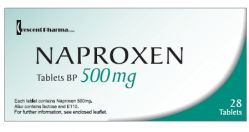Contents
- What is naproxen? Is a naproxen a controlled substance?
- What are the brand names of the naproxen?
- What are the therapeutic uses of naproxen?
- How does naproxen work?
- What is the dosage for naproxen?
- How long naproxen stays in your body?
- Can I get high on naproxen?
- Naproxen “High” experience
- Can I get addicted to naproxen?
- What are the side effects of naproxen?
- When should I call a doctor?
What is naproxen? Is a naproxen a controlled substance?
Naproxen is a NSAID (nonsteroidal anti-inflammatory drug) that works by reducing hormones that cause inflammation and pain in the body. Naproxen is used to treat pain and inflammation caused by arthritis, ankylosing spondylitis, tendinitis, bursitis, gout, or menstrual cramps. The tablets are available in extended release form, which are used for treating chronic conditions like arthritis and ankylosing spondylitis. Such extended release tablet is not able to treat acute pain.

What are the brand names of the naproxen?
Naproxen is a pain killer medication therefore easily available over the counter and also it does not need doctor’s prescription. It is available in tablet formulation under various brand names such as:
- Aleve
- Anaprox
- Anaprox DS
- EC-Naprosyn
- Mediproxen
- Midol Extended Relief
- Naprelan
- Naprosyn
- Pamprin Maximum Strength All Day Relief
What are the therapeutic uses of naproxen?
Naproxen is a non-narcotic pain medication frequently prescribed for the treatment of headaches and other minor aches and pains. Naproxen is also helpful when used as an anti-inflammatory agent for conditions such as arthritis, ankylosing spondylitis, bursitis, tendinitis, gout, menstrual cramps and other disorders of the muscles and bones.
How does naproxen work?
The way that naproxen works in the body is fundamentally different to other opioid prescription pain killers that contain oxycodone, tramadol, or hydrocodone. Naproxen is a pain medication that is known to bind to the opioid receptors in the central nervous system and cause sense of well being called euphoria or dissociation.
This is the reason that you can also feel high. But it needs very high doses of naproxen to produce such effects, and very high doses of naproxen can cause stomach ulcerations and severe stomachache.
The main mechanism of action of naproxen is completely different from this, as per this, naproxen is a NSAID i.e. nonsteroidal anti-inflammatory drugs which acts by inhibiting the synthesis of prostaglandins.
There are cyclooxygenase (COX) enzymes in our body which produces prostaglandins, as soon as naproxen enters into the blood stream, the COX enzymes are blocked, and the pain reduces from minutes to hours. As per mechanism of NSAIDs, these medications are known to alleviate pain, not cause any euphoric effects.
What is the dosage for naproxen?
The usual adult dose for pain is 250 every 6 to 8 hours or 500 mg twice daily using regular naproxen tablets. The usual dose for Naprelan controlled release tablets is 750 to 1000 mg given once daily. For EC-Naprosyn, the usual dose is 375-500 mg twice daily.
Naproxen should be given with food to reduce upset stomach. The dose for rheumatoid arthritis, osteoarthritis, or ankylosing spondylitis is 500 to 1000 mg every 12 hours. Dysmenorrhea is treated with 250 mg every 6 to 8 hours after an initial dose of 500 mg.
How long naproxen stays in your body?
Naproxen is metabolized to 6-0-desmethyl naproxen in the liver and neither naproxen does induce any metabolizing enzymes nor its metabolites. The half life of naproxen and its conjugates is shorter than 12 hours therefore it stays for almost 1 to 2 days in our body. 2-3% of naproxen is eliminated from body in the feces. The metabolites of naproxen may accumulate in the patients with kidney failure.
Naproxen CNS effects
However, there are other ways that naproxen affects the central nervous system. Naproxen may cause neurological effects which can alter or impair physical or mental abilities and affect performance. These include:
- blurred vision
- dizziness
- drowsiness
- lightheadedness
- slowed mental alertness
Naproxen can also cause side effects which affect the gastrointestinal and cardiovascular systems of the body. Furthermore, alcohol consumption increases the risk of gastrointestinal bleeding when combined with naproxen.
Can I get high on naproxen?
No, it is quite less likely that you get high on naproxen. Although there are some online reports of people who get high on naproxen.
Naproxen is a medication that is available over the counter as a non-narcotic anti-inflammatory drug. Naproxen causes lightheadedness actually, visual disturbances, and drowsiness in some users. It is not associated with any kind of euphoric feeling nor does it have abusive properties. Abusers can get high risk of kidney failure and bleeding ulceration in the stomach, if they take higher doses of naproxen in order to achieve a “high” level.
Naproxen “High” experience
There is one example of naproxen high (published on erowid.org), however even in that case, patient took naproxen in combination with cyclobenzaprine.
“I have a herniated disk with 2 pinched nerves/possibly three. I was given by my doctor Naproxen (l 500 mg TEVA-Naproxen EC twice daily) and also Cyclobenzaprine (1 three times daily as needed) as a muscle relaxant. I took it for a very short time as it made me feel like crap. I could only take the two together at bedtime as I could not function on both of them.
I took both to avoid pain while in a test situation and even though it was open-book, I was completely lost. Impossible to concentrate and focus on work. One must take with food but I won’t take both together unless I am going to sleep. I only want to sleep when I do both together and it ruined my day when I needed to do something other than sleep…”
Can I get addicted to naproxen?
No, even after taking naproxen for the long term there are less chances that one can develop addiction to this medication. Even people do not see any kind of withdrawal symptoms after stopping the medication. Also you even cannot get high on naproxen, and cannot develop a mental dependence.
However, you should always talk to your doctor before taking this medication regarding interactions associated with it, and you should always seek emergency medical help if you notice rashes on your skin, swelling, and difficulty in breathing or urinating.
What are the side effects of naproxen?
Naproxen is commonly available as Aleve in the market. It can have some side effects on central nervous system in some users. It can cause headache (3-9%), dizziness (3-9%), drowsiness (3-9%), visual disturbances, lightheadedness, and vertigo.
Although naproxen is not known to cause any euphoric feeling but it seems to make a person little goofy or make them feel goofy in some people. It produces the laziness and drowsiness. Some other side effects of naproxen are:
Side effects of naproxen are not common in all its users, still there are some common side effects:
Common side effects: that occurs in more than 1 in 100 people, which are:
- Stomachache
- Confusion
- Headache
- Ringing in the ears
- Changes in the vision
- Fatigue
- Drowsiness
- Rashes
Less common side effects of naproxen happen in more than 1 in 1,000 people. They include:
- Depression
- Irregular heart beat
- Abnormal dreams
- Forgetfulness
- Difficulty in concentrate
- Sensitivity of skin to light
- Insomnia
Rarely, naproxen can cause some side effects that happen in less than 1 in 1000 people:
- Hair loss
- Problems with hearing
- Inflammation of blood vessels – cause fever, swelling, and generally not feeling well
- Asthma getting worse
- Muscle weakness and pain
- Ulcers on inner cheeks, gums, and tongue
Talk to your doctor or pharmacist if these side effects bother you or don’t go away.
Naproxen hepatotoxicity
Patients who are using naproxen on long-term basis may have serum aminotransferase levels elevated, particularly with high doses. Clinically apparent naproxen induced liver injury is very rare (~1-3 per 100,000 users), but convincing cases have been reported that resemble acute hepatitis and arise within 1 to 6 weeks of starting naproxen.
The time to onset can be as long as 12 weeks, but convincing instances of liver injury arising after long term use have not been described. The pattern of serum enzyme elevations has ranged from hepatocellular to cholestatic injury.
Immunoallergic features and autoantibodies are not common. In most instances, recovery is rapid once naproxen is stopped. Rare instances of acute liver failure attributed to naproxen have been published, but the role of naproxen in these cases was not very convincingly shown.
When should I call a doctor?
High doses of naproxen can lead to severe indigestion and gut or stomach ulcerations, which need to check immediately. Therefore, you should call your doctor right away if you have:
- Severe signs of ulcer or inflammation in the stomach such as severe indigestion, heart burn, pains in stomach, feeling sick or vomiting or diarrhea.
- Signs of bleeding and perforation in the stomach or gut which includes vomiting blood or dark particles (somewhat like coffee grounds), blood in stools, black or tarry stools.
- Signs and symptoms of agranulocytosis (an abnormality in blood cells) such as frequent sore throats, nose bleeds, and infections
- Signs of anemia such as fainting, extreme fatigue, chest pain, or breathlessness.
- If you see, signs of aseptic meningitis including fever, nausea, vomiting, confusion, headache, neck stiffness, and sensitivity to light.
- If you notice, severe skin rashes with flushing, blisters or ulcers.
- Signs of kidney damage or infection such as blood in urine along with fever.
- Signs of inflammation of liver such as yellowing of skin (like in jaundice), or white eyes.
- If you feel increased level of potassium in the blood that cause irregular and slow heartbeats.
- Fever, stomach pain and vomiting can also be associated with inflammation of the pancreas
“How long should I wait to take ibuprofen after taking naproxen?
“Can PCP abuse cause mental health issues?“

